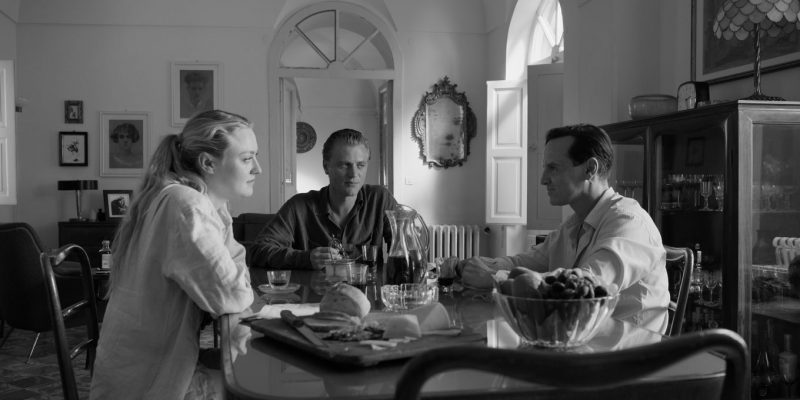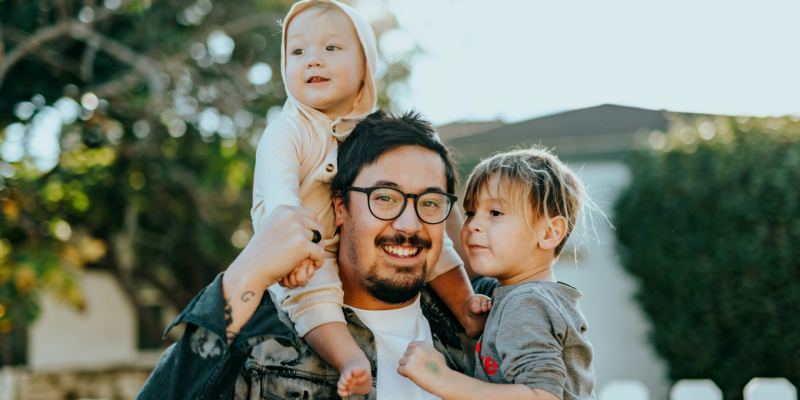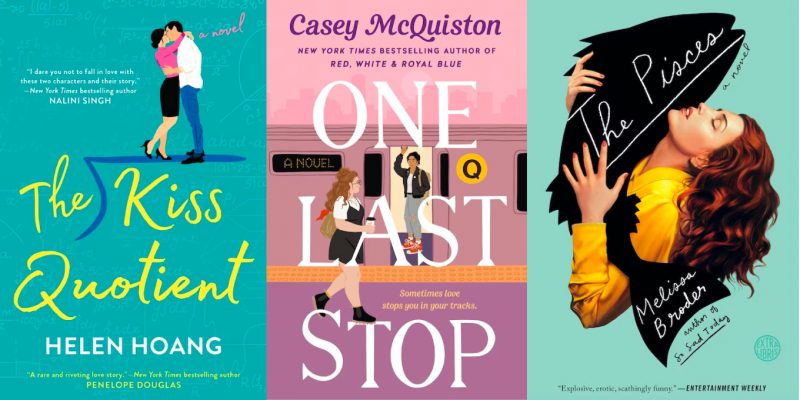Culture
Mariah Carey Is Here to Un-Cancel Christmas
The often-imitated, never-duplicated diva has a plan for holiday cheer—at a time when we’ve never needed it more.
by : Véronique Hyland- Dec 14th, 2020
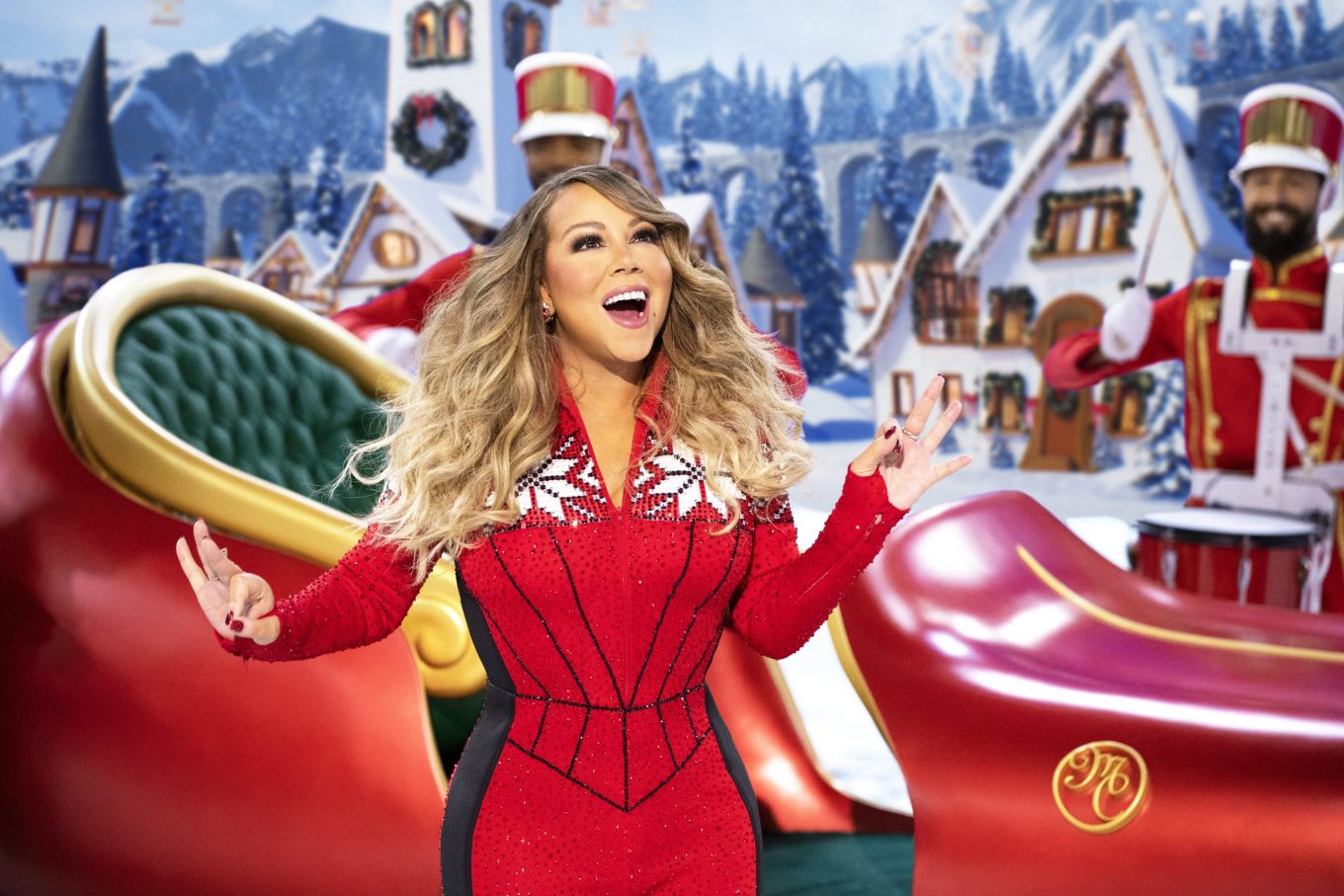
Apple
This story originally appeared on ELLE U.S.
It begins with a few notes of drawn-out longing, stretched to their limit like taffy. I don’t want a lot for Christmas. There is just one thing I need. Then, without warning, all that yearning explodes into a breathless vocal run, a sleigh bell–laced hit of dopamine that feels like getting showered with all the gifts you ever wanted and being reunited with everyone you’ve ever loved, all while an appropriately cinematic amount of snow falls in the background.
No matter how many times you’ve listened to Mariah Carey’s anthem “All I Want for Christmas Is You,” that moment—the Yuletide equivalent of an EDM beat drop—gets you every time. The song has such cultural currency that it begins an upward, Santa’s-sleigh trajectory on Google Trends every year in late fall. This year, it even made an appearance during an impromptu post-election celebration thrown by the comedians Demi Adejuyigbe and Addie Weyrich. Carey herself reposted the clip: the giddy hosts, barely old enough to remember the 1994 hit’s release, gyrating atop a car at an L.A. gas station. Any other holiday favourite serving as the soundtrack to a political victory might have been weird. This seemed right. “It felt great to be a part of those celebratory moments—and it totally took me by surprise,” Carey says of the song’s early-November resurgence when we speak via Zoom. “It’s been such a hard year, and I really feel like people so need a celebratory moment. At every turn, it’s like, ‘We can’t be [together]; you can’t celebrate. This is cancelled; that’s cancelled.’
If Christmas were synonymous with a celebrity, it would surely be Mariah Carey. And as far as Mariah Carey is concerned, many things may be cancelled right now, but the spirit of Christmas is vehemently not. America looks to Carey as an arbiter to help us determine when the festive season is allowed to start. (Last year on November 1, she posted a video of herself announcing “It’s time!” after receiving the go-ahead from Santa.) But the special circumstances created by Covid-19 have meant that the timeline has blurred a bit—as a hedge against pandemic despair, some people in the U.S. and Europe even put up Christmas lights and decorations in March during the first wave of the virus. While Carey normally has ironclad rules about when, exactly, the holiday begins, she’s making a blanket exception this time. “I never want to celebrate too early. I’m always like, ‘We can’t do this; they’re making it happen too soon,’ but I have to go with it this year,” she says.
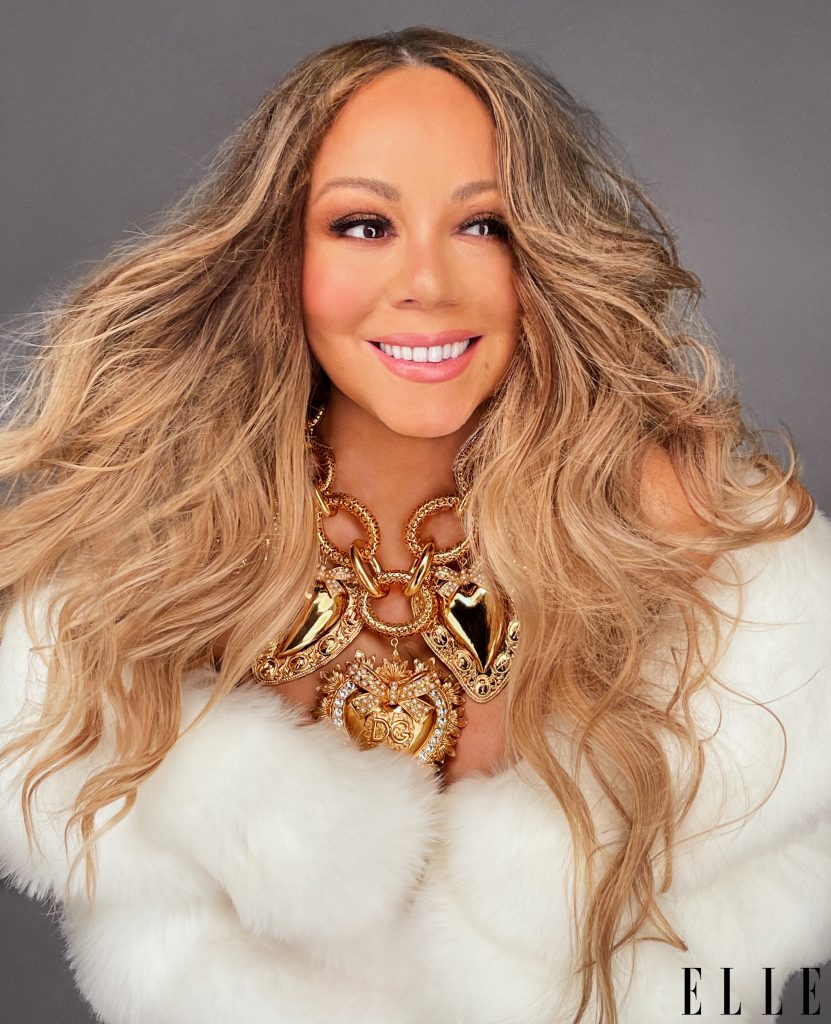 Ruven Afanador
Ruven AfanadorCoat, Adrienne Landau. Necklace, Dolce & Gabbana.
The year 2020 has been indisputably rough, but it’s been a banner one in Mariah World nevertheless. Despite her legendary refusal to acknowledge time, she did celebrate her thirtieth anniversary in the music business with weekly vault drops of fan-pleasing releases, dubbed “MC30.” She came out with a best-selling memoir, The Meaning of Mariah Carey (she says she’s in talks about an onscreen version), as well as a double album of unreleased material and Carey’s personal favourites from her vault called The Rarities. And since February, she’s been preparing Mariah Carey’s Magical Christmas Special, an old-fashioned variety-show spectacular that aired on December 4 on Apple TV+, complete with a soundtrack released on Apple Music the same day, and on all other music streaming services a few days later. The show features a crop of Yuletide riches: a new version of her song “Oh Santa!” with Ariana Grande and Jennifer Hudson, which she calls a “girls’ group moment”; Misty Copeland playing the Sugar Plum Fairy, dancing to “instrumentals” sung by Mariah herself; plus appearances by Snoop Dogg, Billy Eichner, Tiffany Haddish, and Carey’s nine-year-old twins, Moroccan and Monroe, among others.
“As I was watching Mariah [film the special], I wished I had some eggnog.- Tiffany Haddish”
“When I really feel sad, I watch babies laugh and then I start to laugh, too,” Haddish tells me over the phone, a few days after my Zoom chat with Carey. The same effect applied on the Magical Christmas set. “I started to feel the joy,” Haddish says. “We might not be able to gather for Christmas, but to be able to watch a holiday special that reminds us of joy, reminds us of how good it feels to be together, could be just as good as being together. I know that as I was watching Mariah, I wished I had some eggnog.”
An art form unique to this moment in time—like tintypes and scrimshaw before it—is deducing who someone is based solely on the contents of their Zoom rectangle. Now that we’re all trapped in digital dioramas, stacked one on top of another in Brady Bunch fashion, there’s no choice but to draw wild conclusions: Actor X is relatable because he’s sitting on a schlumpy couch; Model Y must be a secret intellectual since The Power Broker is perched on her shelf. There’s so little to work with that celebrity profiles the world over have turned into Rorschach tests.
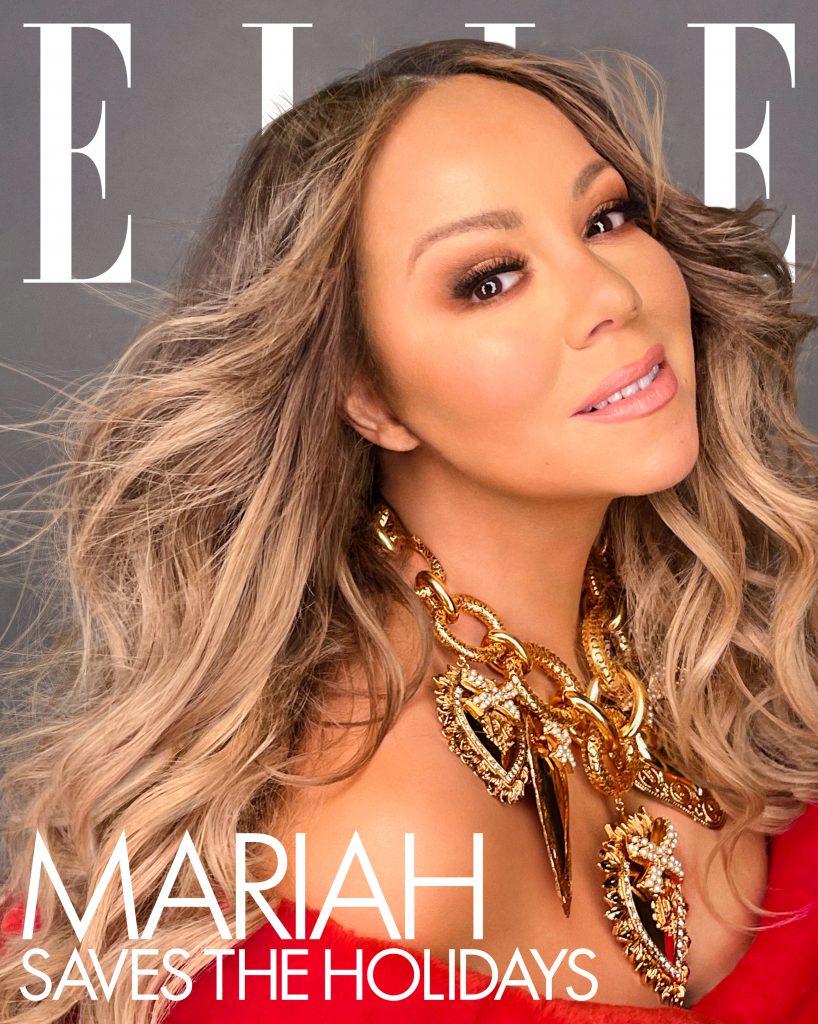 Ruven Afanador
Ruven AfanadorCoat, Maison Atia. Necklace, Dolce & Gabbana.
But Mariah Carey, God bless her, is giving you everything you need right within the confines of that box. As befits a woman obsessed with “moments,” she’s giving you an ensemble moment—a cap-sleeved, forest-green shirt that might be worn by an elf if not for the generous cutout. She’s delivering a casual couch moment, her dog’s snout occasionally popping into frame. And somehow, at the same time, an MGM-era Hollywood moment, with a supporting cast of diamond bracelets and rings whose prismatic quality dazzles even over a webcam. Her gestures play to the back row, like when she says, as the prelude to answering a question, “Let me be more global. Let me put on that hat,” while executing a Fosse-like hat tip. The room she sits in is filled with pillows and soothing shades of teal; it’s after midnight my time, but still relatively early for her, when you take into account her storied night-owl tendencies. There may not be a Christmas tree within view, but to use another Mariah-ism, all is festive.
Carey is explaining her history with the holiday. While many people who love this time of year are often trying to re-create early memories, Carey says her embrace of the season is a corrective to the Christmases she had growing up. “I think it’s just that longing that I had as a child, that I always wanted things to be perfect for the holidays. And they never were,” she says. “It was always somebody ruining the moment, always these dysfunctional family members who came around and foiled everything. And so I just made a pact with myself that I wasn’t going to allow that to happen anymore.” Instead, she’s focused on creating new memories. “After I kind of emerged from my first relationship–slash–marriage,” to record exec Tommy Mottola, who she says kept her under marital surveillance in a Westchester mansion she nicknamed Sing Sing, “I created the Christmases that I wanted to have.”
It’s no wonder she’s made them a glimmering snow globe of childlike fantasies. “I literally go to a snowy place. Reindeer are there,” she tells me of her Christmas protocol, adding, as though I might accuse her of making this up, “I’m not making this up. Santa Claus comes, hangs out with the kids. And by the way, even if I didn’t have kids, I would be doing this.” (Carey’s children are from her marriage to Nick Cannon, which ended in 2016; the two remain devoted coparents.) Carey, who calls herself “eternally 12,” has chosen the path of youthful optimism. There are a lot of reasons for that mindset, she says. “A lot of very bad stuff happened to me when I was 12. But also, there is the spirit of that kid, that fighter who doesn’t give up, who does embrace who she is, even though the world didn’t understand that from my point of view.” She remembers Christmas as “maybe the one time that I got to breathe for a second.”
In Carey’s memoir, released in the fall, she digs into what it was like to grow up with, as she puts it, “nobody in her corner.” To sketch out the contours: Her parents split up when she was young. Money was scarce. She moved constantly. Classmates were often cruel. As a biracial kid, she often felt like she didn’t belong anywhere, even among the two halves of her family. “It’s very difficult to explain to most people who haven’t experienced that on some level,” she says. “Being very ambiguous-looking, that really affected the way people saw me or judged me, depending on what kind of caste system you grew up with.” Among several harrowing anecdotes is a story of being pelted with the N word by popular girls, one of whom had invited her over to her wealthy aunt’s house. Sometimes the aggression was more coded. “There would always be that question of, ‘What are you?’ Not ‘Who are you? How can I get to know you as a person?’ But ‘What are you? Oh, you’re so exotic. What are you mixed with?’ It depends who’s asking the question and how they ask the question.” (Carey says she’s talked to her kids about racism and bullying: “The best way that I can protect them is with knowledge. I can’t prevent it, but I can at least try to make sure they’re aware of it.”)
In the midst of an upbringing that could have been scripted by Dickens, music was her “saving grace,” she says. “It was always something that made me feel worthy.” And while she couldn’t control everything in her life, one thing she was determined to control was her music. At one point, she almost sold the publishing rights to one of her songs for $5,000, “which seemed like a trillion dollars to me back then.” But having watched a documentary about the Beatles, she vowed to hang onto the rights to her songs no matter what, realizing that “this little thing, when I write down words—I have to protect that, because this is something that people try to take from you.”
“The label didn’t understand it. They were like, 'What is a Wu-Tang? What is that?'”
Carey held fast to her musical integrity even as she, once again, experienced the sensation of not fitting neatly into a box—in this case, the one the music industry tried to put her in. When she collaborated with Jay-Z, Missy Elliott, and Busta Rhymes on songs, the suits were nonplussed by her genre-bending ways. “They didn’t grow up with hip-hop. They didn’t understand it,” she says. When she released the “Fantasy” remix, the record company was not exactly down with ODB. “The label didn’t understand it. They were like, ‘What is a Wu-Tang? What is that?’ ” Hip-hop wasn’t the only genre she dipped into. In her memoir, Carey also revealed that she’d indulged in a secret side project in 1995 called Chick, in which she channeled her angst into Courtney Love–esque lyrics, a barbaric Riot Grrrl yawp in the face of increasing suppression in her personal and professional lives. She recalls it as a kind of release valve from chaste, note-perfect hits like “One Sweet Day” and “Always Be My Baby.” “I’m not saying these are not good songs,” she says, but “it’s a pristine kind of a thing in terms of the vocal performance. And after my sessions, when I wasn’t surrounded by the corporate morgue, as I call them, I was like, ‘Let’s just do this.’ ” The less stage-managed life of an alt-rock star appealed to her because “it felt like, well, they can do whatever they want. They can wear whatever they want, say whatever they want.”
America’s five-octave sweetheart couldn’t exactly associate herself with a song comparing herself to “an open blister,” to cite just one lyric. “Certain people in the corporate morgue were not happy, and so they squashed it,” she says, though she fondly remembers driving around Westchester and other parts of upstate New York by herself blasting the album and singing at the top of her lungs. (Sample lyrics: “I don’t wanna be your doormat / I don’t wanna be / No plastic blow-up doll.”) While the vocals on the album were sung by her then-roommate Clarissa Dane, there’s a version with Carey floating out there somewhere. “I’m going to have to go and remix it with all my stuff from back then,” she says. She warns that the remix would probably have a Parental Advisory sticker: “It’s not for the Christmas crowd.”
In contrast to your typical celebrity memoir, which glides from anecdote to anecdote as smoothly as a Zamboni, The Meaning of Mariah Carey doesn’t spoon-feed the reader the expected list of boldface names. The elements and people she decided to include “were basically all life-changing experiences. That’s why the ones that aren’t in the book are not in there, or,” she adds puckishly, “did not exist.” Nor is it a simple story of overcoming challenges to emerge as, if you will, a triumphant butterfly. Instead, it’s about the reality of living with a flawed past and coping with the present (with the help of therapy). While the book doesn’t delve into her 2001 diagnosis of bipolar disorder, it does talk about the aftermath of her surprise TRL appearance that year, clarifying: “I did not ‘have a breakdown.’ I was broken down—by the very people who were supposed to keep me whole.” She tells me the memoir is “a survivor’s story.”
One of the most striking scenes recounts Carey’s sudden realization that she had fans. While recording a Thanksgiving special in Schenectady, of all places, she wondered aloud why the streets had to be barricaded, only to be told, “Miss Carey, it’s for you.” The Lambily, her fan group, would become her surrogate family, and she kept in touch with them early on through her website and voicemail messages, long before you could DM your favorite singer. In the book, Carey takes a counterintuitively positive view of social media—she sees it as a way to provide a counter-narrative to the tabloids, one in which fans can stick up for her. She’s even been embracing TikTok—her kids aren’t allowed to be on it yet, but she has racked up 4 million followers on her own account. (And yes, she has seen the clip of an inexplicably tearful girl dancing to “Obsessed,” which gave the nearly 12-year-old single a bump.) “The only thing I don’t love about [TikTok] is that you only get a snippet of a song,” she says. “So that’s upsetting to me as someone who writes songs, but it’s a great platform for people who wouldn’t have known your music to then connect with you.”
“I love the glamorous stuff and the dress-up of it all. But the truth is, that’s work to me.”
To be a celebrity in 2020 is a weird thing indeed, and not in a “Spare a thought for the celebrities!” way, just in that the job description has changed seemingly overnight. The excess that once came with the designation of Famous Person now feels out of touch, as those who’ve enjoyed celebrations on private islands and mask-free birthday parties while the rest of the world is soberly locked down have come to find. Carey is one of the few who seem to be navigating the transition without capsizing—in part, possibly, because she has a campy, tongue-in-cheek distance from her star persona, which is also somehow mixed with a wholesomely genuine quality. She’s not quite sure herself what it means to be a celebrity right now, or what it feels like for that matter. “When you frame it as ‘celebrity,’ I don’t really know how to answer that question,” she says, momentarily flummoxed. “Because I don’t really see myself as a celebrity. I’m a recording artist. I make music, occasionally. Not to be like, ‘How dare you call me a celebrity?’ ” But the music is what she’s really here for, she says. “I love the glamorous stuff and the dress-up of it all. But the truth is, that’s work to me.”
Haddish has seen Carey’s laser focus on artistry in action. She recalls watching a rehearsal of “All I Want for Christmas Is You” during the filming of the special. After eight or nine takes, the dancers “were clearly getting tired, but they were giving it the best that they had. And she was killing it every time. Not missing a note, not missing a step, not one beat.” Carey also, as Haddish discovered, possesses hidden comedic chops. “Girl, the first song I ever learned was a Mariah Carey song,” she tells me, before breaking into her own melisma-heavy rendition of “Vision of Love.” “I was probably seven, eight, nine years old, and you could not tell me I didn’t sound great.” The first time she spoke to Carey on the phone, Haddish sang for her. “I was like, ‘Okay, you’re probably not going to like this, but I gotta do it,’ and she just fell over laughing: ‘Girl, why do you sound like a cat?’ ” That’s when she realized that Carey, whom she had previously perceived as “fancy fancy,” had a different side to her. “Oh, she’s just like me, silly and fun.”
Eichner met her after Carey started tweeting, “out of nowhere,” he says, about her love of his show Billy on the Street. The two struck up a friendship that began with her singing the theme song to him over the phone (complete with the echo effect on the word “street”) and culminated in her appearing on the show for a Christmas episode last year. Eichner is hardly a Mariah neophyte: He even had his first kiss to the song “And You Don’t Remember,” a deep cut off Emotions. “I’m a Lamb from way back. I’m a Lamb from before Mariah’s fans called themselves Lambs,” he says. Still, even he remembers being startled by “how genuinely funny she is” and how similar their senses of humor are. When he was filming the special, “I threw in jokes just to make Mariah laugh,” he recalls. “I knew they were too insidery or snarky to actually get on the special, I knew they would be cut, but once in a while, I’d throw in a joke just to make her laugh, and she would double over laughing.”
Amid Carey’s disarming silliness, there’s also an openness: about how things are rarely fairy-tale perfect, about how tough life can be. That duality might be the secret to Carey’s appeal in this tricky time. After all, sadness and longing are part of Christmas, too: Think of all the minor-key songs about missing faraway loved ones. “If you don’t love it, you can’t write the songs that really affect people or make people happy, or melancholic, whatever it is, on the holidays,” she says. “I do live from Christmas to Christmas; it’s the only thing I look forward to every year. Well, it’s not the only thing…but it’s truly the best time of year for me.”
Despite it all, she’s psyched for this year’s festivities, even if she’ll have to forgo certain traditions. She sounds a little wistful talking about the tree at Rockefeller Center, which has played host to some of her Christmas performances. “I usually make [it] a moment. I guess probably that’s not going to happen this year. Maybe [I’ll] drive by,” she says. “I hope people feel festive when they watch this special, and I hope it helps in some way. Just like any really good Christmas movie or song can lift your spirits, that was the goal here.” At the end of the day, she just wants to give people something to look forward to, because she herself wants something to anticipate: “If I’m not looking forward to something, it’s bleak.” But as you might expect from a Christmas lover who sings about the perfect vision of love, Mariah Carey believes in miracles, and they are plentiful in her Magical Christmas Special. “I came to it with the spirit of ‘Let’s make it festive no matter what,’ ” Carey says. “If you go into anything with that kind of hopefulness, then it’ll happen.”
Photographed by Ruven Afanador; Styled by Diandre Tristan; Hair by Dior Sovoa; Makeup by Kristofer Buckle for Crosby Carter Management; Manicure by Barbara Warner for The GelBottle; Set Design by Fi Campbell at Stillsets; Produced by Tricia Sherman and Steve Bauerfeind at Bauie Productions. Shot on iPhone 12 Pro Max. Below: Carey wears a custom LaQuan Smith dress.
Newsletter
Join our mailing list for the latest and biggest in fashion trends, beauty, culture and celebrity.
Read Next
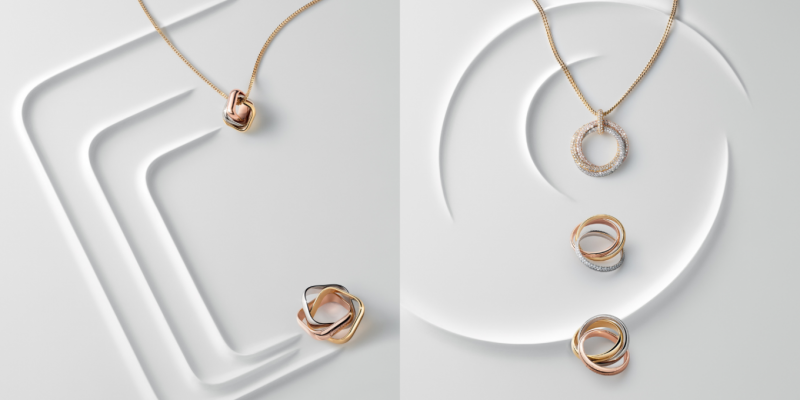
Fashion
Cartier Celebrates 100 Years of the Trinity Ring
What better way to celebrate an anniversary than with a new collection?
by : Allie Turner- Apr 19th, 2024

Culture
How to Spend 48 Hours in Mexico City
Where to discover the hidden gems—markets, mezcal, modern art—of the Central American capital.
by : Jennifer Nguyen- Apr 18th, 2024

Beauty
Tested and Approved: Your New Hydrating Skincare BFF
This new product has all of your skin’s thirst-quenching needs covered.
by : ELLE Canada- Apr 17th, 2024

